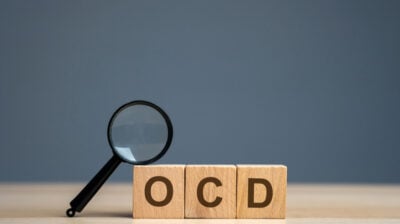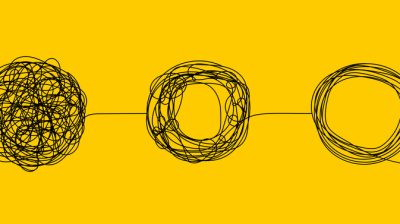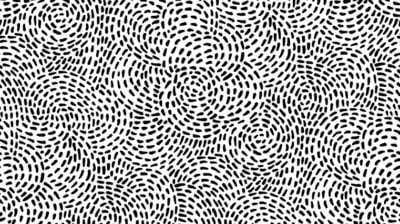What is Obsessive Compulsive Disorder?
There’s more to OCD than constantly washing your hands.

When you mention the term OCD the first thing most people think of is someone who needs to repeatedly wash their hands or likes to keep things nice and tidy. Monica from Friends may even come to mind.
However, there’s far more to Obsessive Compulsive Disorder than you might think.
OCD: The Facts
- Obsessive Compulsive Disorder is a long-term mental health condition that is usually associated with two things: Obsesssive thoughts and compulsive behaviours.
- Obsessions: An obsession is an unwanted, unpleasant thought, image or urge that repeatedly enters a person’s mind. It’s usually frightening or upsetting and, because they can’t shake it, it makes them feel incredibly anxious.
- We all have unpleasant thoughts from time to time but these obsessions completely overwhelm the person with OCD and can interrupt their daily lives.
- Some common obsessions include a fear of harming themselves or others either deliberately or by mistake, the fear of contamination by disease or germs and even the need for everything to be in perfect order.
- Compulsions: These are the repetitive behaviours or mental acts that a person feels compelled to perform to try to avoid or undo the effect of the obsession.
- Most people are aware that their behaviour is unrealistic or out of control but can’t stop acting on the compulsion.
- OCD is actually one of the most common mental health conditions in the world. It’s estimated that up to three in 100 adults and up to five in 100 children and teenagers have OCD. David Beckham counts himself as one of them.
What are the symptoms of Obsessive Compulsive Disorder?
OCD tends to follow a four step pattern and people with the disorder will go through each of the steps in turn.
- Step One – Obsession: This is when the obsessive thought kicks in and ovewhelms your mind.
- Step Two – Anxiety: You become anxious or worried as a result of the obsessive thought.
- Step Three – Compulsion: You adopt a pattern of compulsive behaviour to reduce your anxiety and distress. Someone who is unnaturally worried that their house will be burgled might repeatedly check that their door is locked at least three times before leaving. A person with obsessive thoughts about germs may wash their hands repeatedly.
- Some other common types of compulsive behaviour that affect people with OCD include cleaning, counting, ordering and arranging, hoarding, asking for reassurance, needing to confess, repeating words silently, prolonged thoughts about the same subject and ‘neutralising’ thoughts (to counter the obsessional thoughts or images).
- Step Four – Temporary Relief: The compulsive behaviour allows the person with OCD to take a bit of a breather as the anxiety dies down. However, it will come back and the cycle begins again.
What causes OCD?
Experts have yet to discover exactly why some people have OCD and others don’t, but they do have a few theories.
- Obsessive Compulsive Disorder can sometimes run in families, although no specific genes have been linked to it. A person with OCD is four times more likely to have another family member with the condition compared with someone who does not have OCD.
- Genetic and family studies have also shown that OCD may be related to other conditions, such as tics and Tourette’s syndrome.
- Don’t confuse tics with the little insects: They’re the rapid, repeated, involuntary contractions of a group of muscles.
- Tourettes is a condition that causes a person to make repetitive movements or sounds.
- Increased blood flow or activity in parts of the brain may also be to blame. Brain abnormalities aren’t thought to cause OCD but brain imaging studies have shown that some people with the disorder have increased activity or blood flow in areas of the brain that deal with strong emotions and the response to those emotions. After successful treatment, the same studies showed that activity had returned to normal.
- Stress alone isn’t thought to cause OCD but a particularly stressful or upsetting life event (the death of a family member or friend, a family break up) may trigger the condition in someone who already has a tendancy for it.
- The chemical serotonin also seems to play a part in OCD. It’s a neurotransmitter, which is a chemical that the brain uses to transmit information from one brain cell to another. Experts still aren’t sure exactly what role it plays but imedications that increase the serotonin levels in the brain, such as certain antidepressants, have successfully helped to treat the symptoms of OCD.
It doesn’t matter what age you are, or whether you’re male or female: OCD doesn’t discriminate and can affect anyone at any time.
I think I might have OCD, what should I do?
Well, first things first, don’t panic or feel ashamed. Much like asthma or diabetes, OCD is a health condition that is completely treatable. You can recover so it’s important to get diagnosed early.
You can’t diagnose yourself so the best thing to do is go and visit your GP: they’ll be able to help you figure out exactly what’s going on. The GP might ask you a series of specially designed questions about your daily habits and worries to try and get a better idea of what you’re going through.
After the initial screening (that’s just fancy medical lingo for your first visit) the GP may refer you on to a mental health professional who’ll help you assess how severe your OCD is. It’s usually measured on three levels:
- Mild functional impairment: Obsessive thinking and compulsive behaviour occupy less than one hour of your day.
- Moderate functional impairment: Obsessive thinking and compulsive behaviour occupy one to three hours of your day.
- Severe functional impairment: Obsessive thinking and compulsive behaviour occupy more than three hours of your day.
They’re probably going to ask you more detailed questions to find out how much of your day-to-day life is affected by obsessive-compulsive thoughts and behaviour. It’s important to be open, honest and as accurate as possible with your answers because the only way you can get the right treatment is by letting the professionals know what’s going on.
Remember, there’s no right or wrong answer and you don’t need to be scared: Nobody is going to judge you.
What can I do to treat it?
Well, there are a number of options available to you but your own recommended treatment plan will depend on how much your OCD affects your daily life.
- OCD that causes a small impact on your daily life is usually treated using a short course of cognitive behavioural therapy (CBT). This involves working with a therapist and exposing yourself to the situations that cause you anxiety, but only at a level you can cope with.
- OCD that causes moderate impact to your daily life can be treated with a more intensive course of CBT, or antidepressants. In some cases you might also need to be referred to a specialist mental health service, just to make sure you get all the help you need.
- If your OCD is causing a major impact on your daily life you’ll probably be referred to a specialist mental health service for a combination of intensive CBT and a course of antidepressants.
- In extreme cases (if your OCD is really really bad and numerous rounds of treatment haven’t worked at all) doctors might consider surgery but that’s only ever seen as a last resort.
- Support groups for people with OCD are also available through OCD Ireland. These groups might help reassure you, remind you that you’re not alone and give you a chance to meet other people who are going through the same thing.
How can I support someone who has OCD?
If you have a friend or family member who is trying to deal with OCD then you’re probably going to want to help them.
- Do keep an eye out for strange behaviour. Sometimes the person with OCD will feel so embarrassed or ashamed that they’ll try to hide their compulsive rituals. Recognising the effects of physical rituals can be that bit easier: Someone who washes their hands a lot may have very dry skin. Mental rituals are harder to recognise.
- Don’t be tempted to try and carry out some of the rituals for them. For example, if they need to check doors and windows three times, don’t offer to do the third round for them. It’s natural to want to protect someone we care about but taking on their fears won’t help them solve the issue and move on.
- Do help them to seek treatment and support them as they go through the process of recovery. They’ll notice changes in their lives once therapy has begun and having your support and help will be invaluable.
- Don’t take it all upon yourself either. When someone with OCD decides to get help, a good GP will be able to recognise the signs and get further support from specialists. These professionals can also help you to support your friend or family member.






